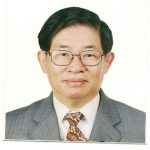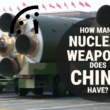No-first use would only embolden China
By Parris H. Chang, September 21, 2016
When President Barak Obama's second term ends in four months, how will he be remembered? As the first African-American president, certainly. But his legacy will also include consequential achievements such as overseeing an economic recovery and expanding access to health care. He'll be remembered for his efforts to slow climate change and, in foreign policy, his pivot to Asia. But another major initiative is reportedly under consideration at the White House—the declaration of a nuclear no-first-use policy.
Nuclear disarmament has been a top priority of Obama's presidency. In April 2009, when Obama had been in office less than three months, he delivered his inspiring Prague speech—in which he pledged to launch a new era of nuclear disarmament and declared "America's commitment to seek the peace and security of a world without nuclear weapons." Six months later he won the Nobel Peace Prize, partly on account of his utopian vision for, and commitment to, a nuclear-free world.
In the years since, Obama has devoted considerable effort to nuclear disarmament and nonproliferation. He oversaw negotiations with Russia toward the New Strategic Arms Reduction Treaty and won confirmation for the treaty in the US Senate. He initiated the Nuclear Security Summit process. He led the United States and other powers in intense negotiations that succeeded in dissuading Iran from developing nuclear arms—even if the international community, despite imposing harsh sanctions on Pyongyang, has so far been unable to halt North Korea's nuclear weapons program.
Does Obama feel morally obligated to pursue nuclear disarmament because the United States is the only country to have used nuclear weapons in wartime? Perhaps—in May he became the first sitting US president to visit Hiroshima since the city was destroyed by an atom bomb in 1945. Critics can question President Truman's decision to drop the bomb. What can't be questioned is that Truman acted out of an imperative to save American lives and win the war. In any event, though the United States hasn't used nuclear weapons since 1945, it has still relied on them to deter aggression, defend allies, and preserve strategic interests.
President Dwight Eisenhower, in his memoir Mandate for Change 1953–1956, wrote that China's accession to the armistice ending the Korean War was due in part to hints by Washington that it might use nuclear weapons against military targets in China. Likewise, during the Taiwan Strait crises in the 1950s, Eisenhower and his secretary of state John Foster Dulles publicly warned Beijing that the United States might use tactical nuclear weapons to forestall a Chinese invasion of Taiwan.
President George W. Bush, in his memoir Decision Points, recalled his futile efforts to gain Chinese President Jiang Zemin's cooperation in efforts to stop North Korea's nuclear weapons program. In February 2003, Bush warned Jiang that "if we could not solve the problem diplomatically, I would have to consider a military strike against North Korea." Jiang and North Korean leader Kim Jong-il took Bush's threat of force seriously. Six months later, the first round of six-party talks over Pyongyang's nuclear weapons program got under way in Beijing.
These are examples of the United States showing determination to use its overwhelming military power, perhaps including nuclear arms, to defend its interests and allies. A US nuclear no-first-use pledge, however, would squander an important piece of Washington's power. It would limit strategic options, undermine the credibility of Washington's promises to defend allies (South Korea in particular would be worried), and reduce US ability to deter aggression. All in all, it would be a gross strategic mistake.
To be sure, China has declared a no-first-use policy, and has demanded that other nuclear powers make the same commitment. But Beijing's own no-first-use policy may be under reconsideration. In 2005, General Zhu Chenghu of China's National Defense University made worldwide headlines when he warned that if the United States intervened in a military conflict over Taiwan, China would launch nuclear attacks on US cities. "We are ready to sacrifice all cities east of Xian," Gen. Zhu claimed. "Of course, the Americans must be prepared for hundreds of their cities to be destroyed." When a reporter raised the issue of China's no-first-use policy, Zhu said "the policy may change"—and asserted that it applies in any case only to conflicts between China and non-nuclear states. US officials were incensed over the general's brazen threat to use nuclear weapons first against US cities.
China is by no means a status quo power. Rather, it seeks to change the international order. It is contesting US political and military supremacy in the Asia-Pacific and challenging the post–World War II Pax Americana. For years China has been substantially modernizing and expanding its conventional and nuclear military forces, and has used its overwhelming capabilities to compel smaller neighbors to settle disputes on Beijing's terms. Moreover, China has built up its anti-access and area-denial capabilities—hoping to deter, delay, and defeat US intervention.
It would be extremely unwise for President Obama to proclaim a nuclear no-first-use policy. Chinese leader Xi Jinping would construe it as a sign of US military decline, and he would only be emboldened to pursue China's dream of supplanting the United States as the world's superpower.
Topics: Nuclear Weapons
Share: [addthis tool="addthis_inline_share_toolbox"]














